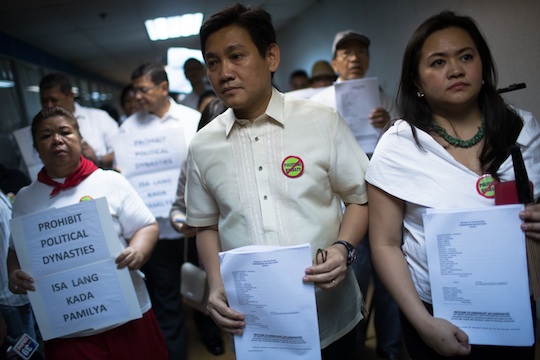SUMMARY
This is AI generated summarization, which may have errors. For context, always refer to the full article.
.jpg)
MANILA, Philippines – In what could be a test case for the Commission on Elections, a group asked the poll body on Tuesday, February 5 to disqualify candidates from 4 “political dynasties.”
The Anti-Dynasty Movement (ANDAYA MO) filed a petition seeking for the disqualification of 6 candidates whom they said are part of “clear and obvious” cases of political dynasties.
These include Davao City Vice Mayor Rodrigo Duterte (who aims to reclaim the mayoral post from his daughter, incumbent Davao City Mayor Sarah Duterte), Dennis Pineda (running mate of his mother Lilia; the two are seeking the posts of vice governor and governor of Pampanga, respectively); Miguel and Luis Villafuerte of Camarines Sur (the grandson Miguel is running against his grandfather for the post of governor in Camarines Sur) and Rexlon and Sherwin Gatchalian (Rexlon is running for mayor in Valenzuela, a post currently being held by Sherwin).
Political activist Mae Paner, more popularly known as Juana Change, said “clear and obvious” cases of political dynasties include one, candidates who aim to replace their spouse, parent, child or sibling and two, candidates who run in tandem for mayor and vice mayor and other local posts.
“For example, a father passes his position to his kid, in the next elections, to another relative – isn’t that obvious?” she said.
Law not from Congress
Lawyer Alex Lacson said even if Congress has yet to pass a law defining political dynasties, there are “legal grounds” on banning political dynasties.
He cited the case of Manila Prince v. GSIS, where the SC ruled that the “executive department has a constitutional duty to implement laws, including the Constitution before Congress acts.”
The 1987 Constitution prohibits political dynasties. Sec. 26, Article II stipulates that “The State shall guarantee equal access to opportunities for public service and prohibit political dynasties as may be defined by law.”
Congress has yet to pass a law defining political dynasties, however. Lacson said though that the provision did not require that the law should emanate from Congress. The Executive could implement the constitutional provision against political dynasties on its own, he said.

The SC has recently issued a decison that goes against this viewpoint, however.
The SC – in its ruling on a petition filed by businessman Louis Biraogo seeking the passage of a law defining political dynasties – said that in Manila Prince v. GSIS, the constitutional provision giving preference to Filipinos in concessions on national economy is a “mandatory, positive command which is complete in itself and which needs no further guidelines or implementing laws or rules for its enforcement.”
This is not the case as far as political dynasties are concerned, however. The High Court said the Constitution is clear in saying that Congress should first pass a law before the prohibition could be put in place.
“It is evident from the plain wordings of the provision against political dynasties, particularly Sec.26, Article II of the 1987 Constitution, which reads: ‘the State shall guarantee equal access to opportunities for public service and prohibit political dynasties as may be defined by law,’ that it is not self-executing but it is simply a statement of a general principle which further requires a law passed by Congress to define and give effect thereto,” the SC said.
Other legal standards
The group said in its petition that there are other legal standards.
The “plain and ordinary meaning” principle in constitutional construction is one. The group said in its petition that the term political dynasties should best be read and understood in its “plain and ordinary” meaning.
The party said that the legal and layman definition of the term political dynasties says the same thing.
In Navarro v. Ermita, Justice Antonio Carpio defined political dynasties as a “phenomenon that concentrates political power and public resources with the control of a few families.” ANDAYA MO stressed that the decisions of the SC are part of the law of the country.
The Black’s Law Dictionary defines dynasty as a “succession of rulers from the same line or family.”
Second, the group said it is the clear intent of the framers of the Constitution to prohibit clear and obvious political dynasties, noting that Commissioner Jose Nolledo – the principal sponsor of the anti-political dynasty provision – had said that he wanted the provision to “do away with political monopoly.”
Existing laws under the Civil Code and the Constitution that prohibit the appointment of relatives of up to the fourth degree of consanguinity also show that “concentration of power in the hands of a single family” should be prevented.
ANDAYA MO said that if the Comelec decides in their favor, other candidates from other “political dynasties” would also be consequently barred from seeking elective posts. – Rappler.com
Add a comment
How does this make you feel?
There are no comments yet. Add your comment to start the conversation.